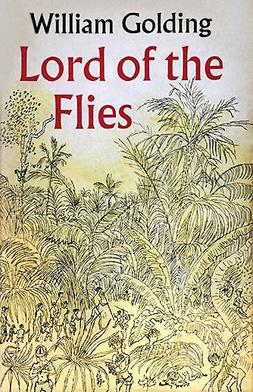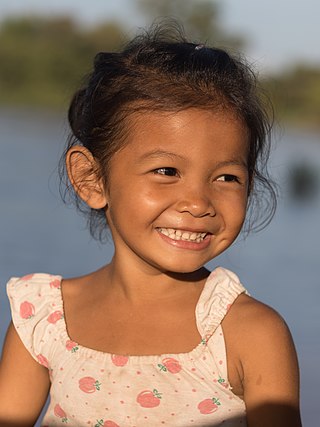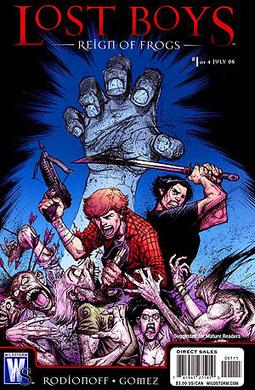Infanticide is the intentional killing of infants or offspring. Infanticide was a widespread practice throughout human history that was mainly used to dispose of unwanted children, its main purpose being the prevention of resources being spent on weak or disabled offspring. Unwanted infants were usually abandoned to die of exposure, but in some societies they were deliberately killed. Infanticide is generally illegal, but in some places the practice is tolerated, or the prohibition is not strictly enforced.

Lord of the Flies is the 1954 debut novel of British author William Golding. The plot concerns a group of British boys who are stranded on an uninhabited island and their disastrous attempts to govern themselves. The novel's themes include morality, leadership, and the tension between civility and chaos.

Cherokee spiritual beliefs are held in common among the Cherokee people – Native American peoples who are Indigenous to the Southeastern Woodlands, and today live primarily in communities in North Carolina, and Oklahoma. Some of the beliefs, and the stories and songs in which they have been preserved, exist in slightly different forms in the different communities in which they have been preserved. But for the most part, they still form a unified system of theology.
Diné Bahaneʼ, is a Navajo creation story that describes the prehistoric emergence of the Navajo as a part of the Navajo religious beliefs. It centers on the area known as the Dinétah, the traditional homeland of the Navajo, and forms the basis of the traditional Navajo way of life and ceremony. Throughout the stories the importance of cardinal points and the number four are emphasized in multiple aspects.
In Lakota mythology, Unk Cekula is a serpentoid creature which was responsible for many unexplained disappearances and deaths. Her male counterpart is known as Unk Tehi.
The Abenaki people are an indigenous peoples of the Americas located in the Northeastern Woodlands region. Their religious beliefs are part of the Midewiwin tradition, with ceremonies led by medicine keepers, called Medeoulin or Mdawinno.

In mythology, folklore and speculative fiction, shapeshifting is the ability to physically transform oneself through unnatural means. The idea of shapeshifting is in the oldest forms of totemism and shamanism, as well as the oldest existent literature and epic poems such as the Epic of Gilgamesh and the Iliad. The concept remains a common literary device in modern fantasy, children's literature and popular culture.

The Fifth Child is a short novel by the British writer Doris Lessing, first published in the United Kingdom in 1988, and since translated into several languages. It describes the changes in the happy life of a married couple, Harriet and David Lovatt, as a consequence of the birth of Ben, their fifth child. A sequel, Ben, in the World (2000) recounts Ben's life after he has left his family.

Re: Colonised Planet 5, Shikasta is a 1979 science fiction novel by Doris Lessing, and is the first book in her five-book Canopus in Argos series. It was first published in the United States in December 1980 by Alfred A. Knopf, and in the United Kingdom in November 1979 by Jonathan Cape. Shikasta is also the name of the fictional planet featured in the novel.
Female infanticide is the deliberate killing of newborn female children. Female infanticide is prevalent in several nations such as China, India and Pakistan. It has been argued that the low status in which women are viewed in patriarchal societies creates a bias against females. The modern practice of gender-selective abortion is also used to regulate gender ratios.
A cleft is an opening, fissure, or V-shaped indentation.
Kiviuq is a legendary hero of the epic stories of the Inuit of the Arctic regions of northern Canada, Alaska and Greenland.

A girl is a young female human, usually a child or an adolescent. When a girl becomes an adult, she is generally referred to as a woman. However, the term girl is also used for other meanings, including young woman, and is sometimes used as a synonym for daughter or girlfriend regardless of age. In certain contexts, the usage of the term girl for an adult woman may be considered derogatory. Girl may also be a term of endearment used by an adult, usually a woman, to designate adult female friends. Girl also appears in compounds like showgirl, cowgirl, and schoolgirl.

The Forest House is a fantasy novel by American writers Marion Zimmer Bradley and Diana L. Paxson, though the latter is uncredited by the publisher. It is a prequel to Bradley's Arthurian novel The Mists of Avalon.
Earth's Children is a series of epic historical fiction novels written by Jean M. Auel set circa 30,000 years before the present day. There are six novels in the series. Although Auel had previously mentioned in interviews that there would be a seventh novel, publicity announcements for the sixth confirmed it would be the final book in the sequence.

The epic of Jangar or Jangar epic is a traditional oral epic poem (tuuli) of the Mongols. It was long thought to be particular to the Kalmyks, but is now known to also be widely told among the Oirats in Mongolia, China and Russia. The story is recited by singers called Jangarchi. The Jangar has approximately 25 or 26 chapters, though certain versions may have more than 100 chapters.

Lost Boys: Reign of Frogs is a four-issue comic book mini-series that was released from May to August 2008. It was published by Wildstorm and the story is set between The Lost Boys and Lost Boys: The Tribe.

Frankenstein; or, The Modern Prometheus is an 1818 novel written by English author Mary Shelley. Frankenstein tells the story of Victor Frankenstein, a young scientist who creates a sapient creature in an unorthodox scientific experiment. Shelley started writing the story when she was 18, and the first edition was published anonymously in London on 1 January 1818, when she was 20. Her name first appeared in the second edition, which was published in Paris in 1821.

Peter Pan; or, the Boy Who Wouldn't Grow Up, often known simply as Peter Pan, is a work by J. M. Barrie, in the form of a 1904 play and a 1911 novel titled Peter and Wendy, often extended in Peter Pan and Wendy. Both versions tell the story of Peter Pan, a mischievous little boy who can fly, and has many adventures on the island of Neverland that is inhabited by mermaids, fairies, Native Americans, and pirates. The Peter Pan stories also involve the characters Wendy Darling and her two brothers John and Michael, Peter's fairy Tinker Bell, the Lost Boys, and the pirate Captain Hook. The play and novel were inspired by Barrie's friendship with the Llewelyn Davies family.
A relatively common motif in speculative fiction is the existence of single-gender worlds or single-sex societies. These fictional societies have long been one of the primary ways to explore implications of gender and gender-differences in science fiction and fantasy. Many of these predate a widespread distinction between gender and sex and conflate the two.











